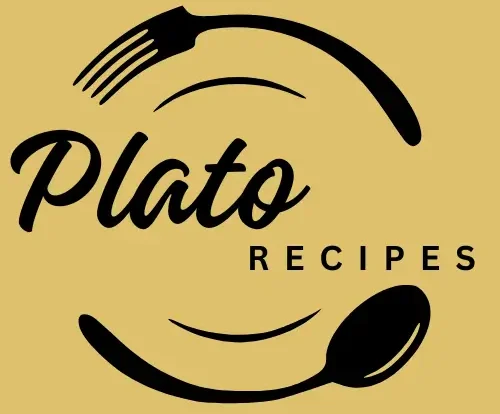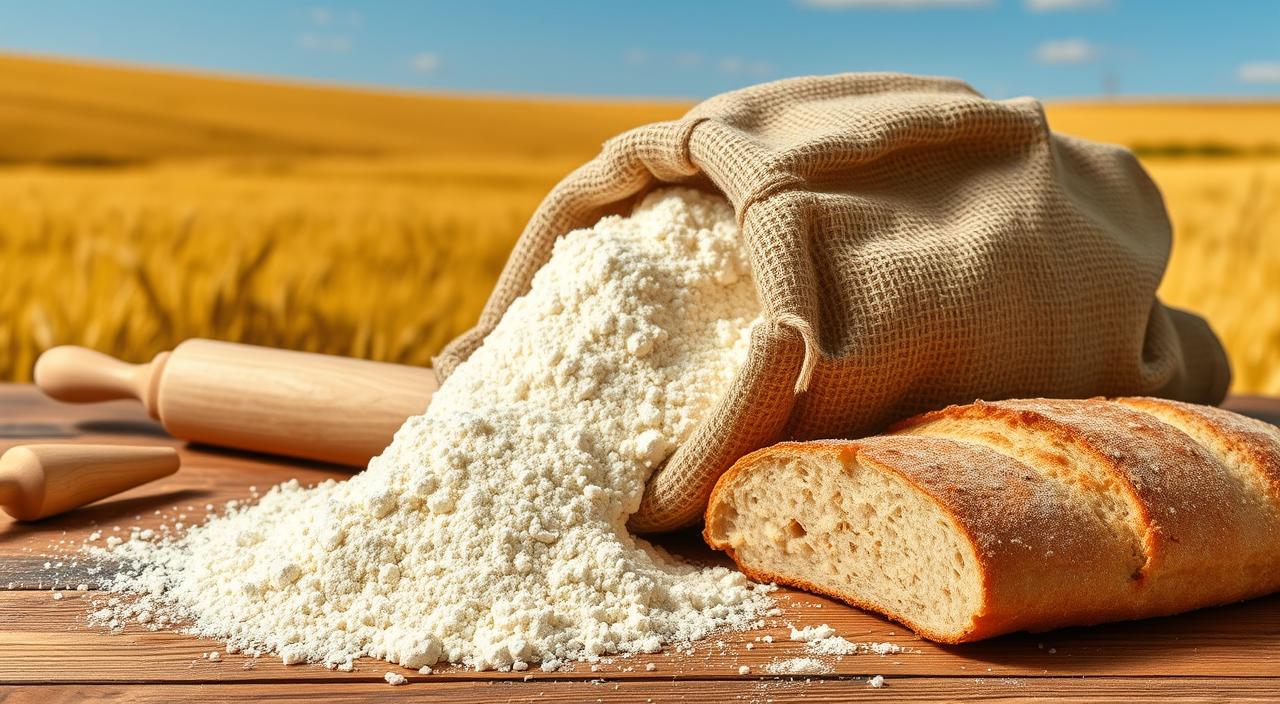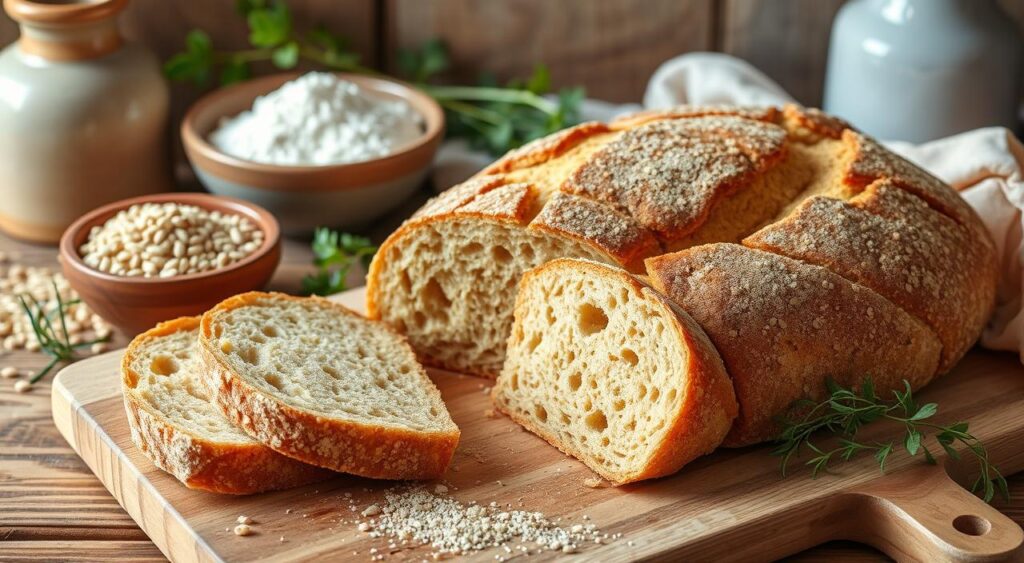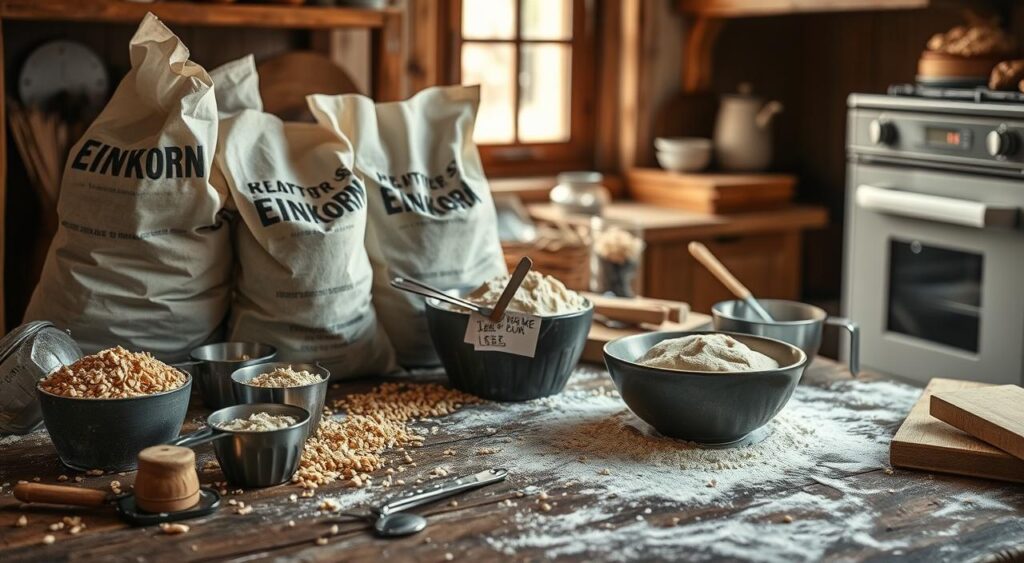The first time I tasted bread made with einkorn flour, I knew it was special. This ancient grain added a depth of flavor and nutrition that regular wheat couldn’t. Finding einkorn flour was like discovering a treasure for healthier baking.
Einkorn flour takes us back to our roots in agriculture. It’s different from modern wheat, offering unique qualities for bread making. Choosing einkorn flour means you’re getting a rich, unchanged nutritional profile for thousands of years.
Bread lovers and health-focused bakers are turning to einkorn flour. It has less gluten and more nutrients than regular wheat. This ancient grain makes breads taste nuttier and might be easier to digest.
Key Takeaways
- Einkorn flour is an ancient grain with unique bread-making properties
- Offers a richer, nuttier flavor compared to traditional wheat flour
- Potentially more digestible for people with wheat sensitivities
- Requires slightly different baking techniques than standard flour
- Provides higher nutritional value than conventional wheat flour
Understanding Ancient Grains and Their Origins
Ancient wheat takes us on a journey through history. Einkorn, one of these grains, was first grown in the Fertile Crescent over 10,000 years ago. It stayed mostly the same for thousands of years, unlike today’s wheat.
Einkorn’s history is a tale of human ingenuity. It was a key food for ancient people in the Middle East. Its health benefits and durability made it a staple for many.
The Rich Historical Landscape of Einkorn
Einkorn’s role in history goes beyond just food. It was used for:
- Producing hearty flatbreads
- Creating nutritious porridges
- Brewing traditional ale
- Supporting agricultural practices
Traditional Uses Across Civilizations
“Einkorn was not just a grain, but a lifeline for early agricultural societies.” – Agricultural Historians
From Iraq to Jordan, einkorn was a vital food. It helped communities grow and thrive in tough conditions.
Modern Revival of Ancient Grains
Today, bakers and health lovers are finding einkorn again. Its rich nutrients and special taste have made it popular.
By exploring einkorn, you connect with a grain with over 10,000 years of history in every kernel.
Nutritional Benefits of Einkorn Flour
Discover the amazing einkorn nutrition that makes it different from modern wheat. Einkorn flour is full of unique health benefits. It can change your diet and help your overall health.
Einkorn has a lot of protein, unlike modern wheat. This ancient grain has a special nutrient profile. It stands out in several important ways:
- Higher levels of essential minerals like iron, zinc, and magnesium
- Rich in vitamin E and lutein, known as the “eye vitamin”
- More dietary fiber compared to traditional wheat varieties
“Einkorn is not just a flour, it’s a nutritional time capsule from our agricultural past.” – Nutrition Experts
Your body will love the special features of einkorn flour. It has only 14 chromosomes, unlike modern wheat’s 42. This makes einkorn’s nutrition different. Studies show it might help control blood sugar and support metabolic health.
The health benefits go beyond just nutrition. Einkorn has more antioxidants than modern wheat. Studies suggest it could be good for your eyes and protect cells. It also has less gluten, which might be easier to digest for some.
Tip: When adding einkorn flour to your diet, start with small amounts. This way, you can see how your body reacts and enjoy its unique nutty taste.
Why Choose Einkorn Flour for Bread Making
Baking with einkorn flour brings unique benefits. It’s a nutritious and tasty choice compared to modern wheat. If you’re looking for a healthier bread option, einkorn flour is worth trying.
Digestibility and Gluten Sensitivity
Those with gluten sensitivity may find einkorn easier to digest. Einkorn has fewer chromosomes than modern wheat, which could help with digestion. Its unique proteins make einkorn bread a gentler choice for many.
Flavor Profile and Texture
Einkorn bread has a rich, nutty flavor that fans love. It’s denser yet softer than regular wheat bread, offering a better eating experience.
- Richer nutrient content
- Lower starch levels
- Distinctive nutty flavor
- Potential improved digestibility
Natural Properties and Health Benefits
Einkorn flour is packed with nutrients. It has more protein and minerals like phosphorus, manganese, and zinc. Dr. Davis’s research shows einkorn bread might affect blood sugar less than regular wheat bread.
“Einkorn wheat represents a return to our agricultural roots, offering a more natural and nutrient-dense bread experience.”
Choosing einkorn flour means picking a natural, often organic ingredient. It connects you to traditional farming and supports your health goals.
Essential Characteristics of Einkorn Flour
Einkorn flour is special because of its unique qualities. It’s different from modern wheat flours. Baking with einkorn offers a unique experience.
Einkorn flour has a creamy, golden color. It looks richer than regular wheat flour. When you touch it, it clumps because of its high oil content.
“Einkorn is a living connection to our agricultural heritage, with properties that tell a story of thousands of years of cultivation.”
Key characteristics of einkorn flour include:
- Unique chromosomal structure (14 chromosomes compared to modern wheat’s 42)
- Higher nutrient density with increased levels of:
- Calcium
- Iron
- Potassium
- Vitamins A and B6
- Silky, smooth texture when mixed with water
- Slightly sticky consistency
Baking with einkorn is different. The flour breaks apart easily and feels stickier. You’ll need to adjust your mixing and kneading to get the right dough.
Einkorn flour also weighs differently. A fresh milled cup of einkorn is about 1¼ cups of commercial flour. This is important for accurate baking.
Baking Techniques for Einkorn Bread
Mastering einkorn bread requires understanding some unique baking techniques. Einkorn flour presents both challenges and opportunities for home bakers. It’s a chance to explore ancient grain bread making.
Dough Hydration Essentials
When working with einkorn flour, dough hydration becomes critical. Unlike modern wheat, einkorn requires careful moisture management. You’ll want to reduce hydration by about 25% compared to standard bread recipes.
- Aim for 75% hydration for optimal results
- Keep hands wet during mixing to prevent sticking
- Use mixing water to manage dough consistency
Mixing and Kneading Strategies
Einkorn’s unique protein structure demands special mixing techniques. The flour’s low gluten content means you’ll need a gentler approach to develop structure.
- Mix slowly to prevent overworking the dough
- Use wet hands to prevent excessive sticking
- Avoid aggressive kneading
Rising and Temperature Control
Einkorn bread ferments faster than traditional wheat breads. Expect shorter rising times and more active yeast development. The total rising time typically ranges from 1 to 1.25 hours.
“Patience and careful observation are key when working with einkorn flour.” – Traditional Baker
Baking tips for success include maintaining a consistent temperature around 375°F. Watch for signs of over-proofing. Your total baking time should be 40-45 minutes. This yields a nutrient-rich loaf with a unique flavor profile.
Common Challenges When Baking with Einkorn
Baking with einkorn flour can be tricky for home bakers. It’s different from regular wheat flour. You need a special way to get the best bread.
Some common issues include:
- Dough consistency variations
- Slower liquid absorption
- Reduced rising capacity
- Different gluten structure
Fixing einkorn bread starts with knowing its special traits. It soaks up liquids slowly, taking 10-15 minutes after mixing. So, be patient while preparing.
“Einkorn flour demands a gentler touch and more attentive technique compared to modern wheat flour.”
Here are some tips to help:
- Weigh your flour precisely (130-138g per cup)
- Minimize mixing time to prevent dough collapse
- Expect only 40-50% rise during proofing
- Adjust liquid quantities by increasing 5%
With time, you’ll get the hang of einkorn baking. You’ll make tasty, healthy bread that celebrates this ancient grain’s special qualities.
Storage and Handling of Einkorn Flour
Keeping einkorn flour quality high needs careful storage methods. Unlike modern wheat flour, einkorn’s special traits affect its shelf life and storage needs.
For einkorn storage, knowing the best practices is key. It helps keep the flour’s nutritional value and stops spoilage. Here are important tips for storing grains well:
- Store whole grain einkorn flour in airtight containers
- Keep flour in cool, dark places
- Maintain temperatures between 50-70°F (10-21°C)
- Control humidity levels below 15%
Shelf Life Considerations
Flour shelf life changes with storage conditions. Whole einkorn wheat berries can last 30 years with proper storage. Ground einkorn flour, however, has a shorter lifespan:
- Room temperature storage: 3-6 months
- Refrigerated storage: Up to 1 year
- Frozen storage: 1 year or longer
Pro tip: Always check for signs of rancidity like off-smell or unusual texture before using stored flour.
By sticking to these storage tips, you’ll keep einkorn flour’s unique nutritional profile and flavor. This ensures great baking results every time.
Comparing Einkorn to Modern Wheat Flour
Exploring the einkorn vs wheat flour comparison reveals interesting differences. Einkorn flour is unique compared to modern wheat in several key areas. These differences affect both nutrition and how well it bakes.
Key differences between einkorn and modern wheat flour include:
- Protein content: Einkorn wheat berries contain 9g of protein per serving
- Grain composition: 81% whole grain in organic einkorn flour
- Nutritional profile: Higher levels of zinc and potassium
Working with einkorn flour in baking shows some unique challenges. Despite common myths, einkorn has the same gluten content as modern wheat. This means you’ll need to adjust your baking methods to get the best results.
“Einkorn represents a connection to our agricultural heritage, offering a unique approach to traditional baking.” – Grain Research Institute
The flour comparison shows that einkorn’s traditional farming methods give it special traits. Unlike modern wheat, bred for large-scale farming, einkorn keeps its original genetic makeup. This affects its nutritional value and taste.
Using einkorn flour in baking will give you a different experience than using wheat flour. You’ll notice a nuttier taste, a denser texture, and a richer nutritional profile. These traits remind us of ancient grain cultivation.
- Cost: Einkorn berries range from $3.00 to $5.00 per pound
- Yield: Lower agricultural production compared to modern wheat
- Nutritional advantage: Higher micronutrient content
Knowing these differences helps you make better choices for your baking and nutrition.
Where to Source Quality Einkorn Flour
Finding quality einkorn flour can be tough for home bakers and cooking fans. It’s not common in regular grocery stores. But, many reliable online einkorn suppliers make it easy to buy einkorn flour.
- Jovial Foods: A top einkorn supplier with authentic, organic products
- Thrive Market: An online spot for organic and specialty flours
- Nuts.com: Offers high-quality whole grain and organic einkorn flour
- Amazon specialty food sections: Many verified einkorn flour brands
“Choosing the right einkorn flour is crucial for achieving authentic, nutritious baking results.”
When buying einkorn flour, keep these tips in mind:
- Make sure it’s organic
- Look for non-GMO verification
- Check the packaging date for freshness
- Compare prices per pound
If you want more control, try buying einkorn wheat berries. Milling your own flour means you get the best taste and nutrition.
Conclusion
Einkorn bread baking is more than a cooking skill. It connects us to our farming past. By trying einkorn, you discover a world of health benefits and tastes that modern wheat can’t offer. Making artisan bread with einkorn flour is a challenge but it’s a healthier choice.
Einkorn’s benefits go beyond taste. Studies show it’s easier to digest and may be healthier. Using einkorn in your baking means you’re part of a nutritional shift. It honors old farming ways and boosts your health.
Learning to bake with einkorn takes time and effort. But the outcome is worth it. Every loaf you make helps us understand our food’s history. It supports green farming and feeds your body with a grain that’s been around for ages. Your journey with einkorn is just starting. Enjoy the learning and every tasty bite.
FAQ
What is einkorn flour and why is it different from regular wheat flour?
Einkorn flour comes from the oldest wheat variety. It’s not changed like modern wheat. This makes it easier for some with gluten issues to digest. It tastes rich and nutty, and is more nutritious than regular flour.
Is einkorn flour suitable for people with gluten sensitivities?
Einkorn flour has gluten, but its structure is different from modern wheat. Some with mild gluten issues might find it better. But, it’s not safe for those with celiac disease. Always talk to a doctor before changing your diet.
How does einkorn flour’s nutrition compare to regular flour?
Einkorn flour has more protein, vitamins, and minerals than modern wheat. It’s packed with lutein, good for your eyes. It’s a healthier choice than regular wheat products.
What special techniques are needed when baking with einkorn flour?
Baking with einkorn needs special care. It soaks up less water and is stickier. It also ferments faster. Adjust the water, knead gently, and watch the rising time to get the right texture.
Where can I purchase high-quality einkorn flour?
You won’t find einkorn flour in most stores. Look for brands like Jovial at health food stores or online. You can also mill whole einkorn wheat berries to make your flour.
How should I store einkorn flour to maintain its quality?
Einkorn flour’s high oil content can cause it to spoil quickly. Keep it in an airtight container in a cool, dark place. Refrigeration or freezing can help it last longer. Always check for any bad smells or color changes.
Can I substitute einkorn flour directly in my existing bread recipes?
No, direct substitution is not recommended. Einkorn flour needs different liquid ratios and mixing times. Start with recipes made for einkorn flour for the best results.
What does einkorn bread taste like?
Einkorn bread has a rich, nutty flavor. It’s more complex than modern wheat bread. Many find its robust, earthy taste with a hint of sweetness more interesting.



